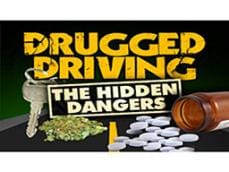Overall, most people seem to have gotten the message that drunk driving is dangerous, but the same message doesn’t seem to be getting out about drugged driving.
Unlike alcohol where it’s known how much in the blood causes impairment, the same can’t be said about other drugs. The waters get murkier when prescription drugs enter the mix since there are so many combinations people take. Some medicines for common ailments could cause impairment when mixed together.
Во время этой часовой программы Drugged Driving: The Hidden Dangers, learn how big the problem really is and why it’s so difficult to do more to solve it. See how one group that promotes highway safety started a public awareness campaign to spread the word about the dangers of drugged driving. Find out why it can be difficult to prove impairment.
Ключевые идеи:
- Learn about the problem of drugged driving
- Find out which drugs are involved and which are most prevalent
- See how the Delaware Office of Highway Safety is trying to raise awareness
- Hear about difficulties surrounding roadside identification of impaired driving
Поставщики контента:
Tim McClure Jr., Investigator & DRE, Ford County Sheriff’s Office, Kansas
Investigator Tim McClure Jr. is currently assigned to work primarily narcotics but also investigates all other forms of crimes with the Ford County Sheriff’s Office in Kansas. McClure started his career in 1997 and prior to joining the Ford County Sheriff’s Office as an investigator, McClure was a Sergeant with the Dodge City Police Department.
In addition to being a Drug Recognition Expert (DRE), McClure is also a Kansas Certified Paramedic. He received his Associates Degree in Applied Science with the emphasis in Criminal Justice from the Dodge City Community College in Dodge City, Kansas in 2005.
McClure is an instructor for the Multijurisdictional Counterdrug Task Force Training (MCTFT) program, one of the National Guard Counterdrug schools.
Dr. Marilyn Huestis, Senior Investigator and Chief, Chemistry and Drug Metabolism Section, Intramural Research Program, National Institute on Drug Abuse, National Institutes of Health
Dr. Huestis is interested in the disposition of drugs and metabolites in a wide variety of biological fluids and tissues following controlled drug administration; data that provide a scientific database for interpreting drug concentrations in many alternative matrices.
She has published 229 peer-reviewed manuscripts, book chapters, monographs and over 298 abstracts presented at national and international meetings.
Huestis received a bachelor’s degree in biochemistry from Mount Holyoke College (cum laude), a master’s degree in clinical chemistry from the University of New Mexico (with honors), and a doctoral degree in toxicology from the University of Maryland Baltimore (with honors). Huestis received a Doctor Honoris Causa from the Faculty of Medicine, University of Helsinki in Finland in 2010.
Kevin A. Sabet, Ph.D., Senior Advisor, White House Office of National Drug Control Policy (ONDCP)
Working on drug policy issues for more than 16 years, Kevin Sabet, Ph.D., currently serves in the Obama Administration as Senior Advisor to Director Kerlikowske at the White House Office of National Drug Control Policy (ONDCP). In his position, Sabet advises Director Kerlikowske on all matters affecting priorities, policies, and programs of the National Drug Control Strategy.
Before joining ONDCP in 2009, Sabet consulted in a private capacity on drug policy initiatives for the United Nations, local governments, and various non-profit organizations.
As a Marshall Scholar, Sabet received his Ph.D. and M.S. in Social Policy from Oxford University and graduated with a B.A. in Political Science from the University of California, Berkeley.
Stephen Talpins, Former Prosecutor, Vice President of the Institute for Behavior and Health
Stephen Talpins is an advocate, consultant and trial attorney who represents clients and works with stakeholders in the commercial, substance abuse, correctional, and public sectors.
Talpins is the Co-Founder, Chairman of the Board and Chief Executive Officer of the National Partnership on Alcohol Misuse and Crime (NPAMC), an inclusive non-profit public-private partnership based in Washington, DC that is committed to identifying, developing, and promoting criminal justice programs that improve public safety, reduce recidivism and change lives for offenders who misuse alcohol. He also is the Vice President of the Institute for Behavior and Health.
Talpins formerly served as National Director of Public Policy for Mothers Against Drunk Driving (MADD), and as an Assistant State Attorney with the Miami-Dade County (Florida) State Attorney’s Office.
Talpins graduated from Northwestern University with a B.S. in Speech Communications in 1989. He graduated from the University of Miami School of Law, cum laude, in 1992.


